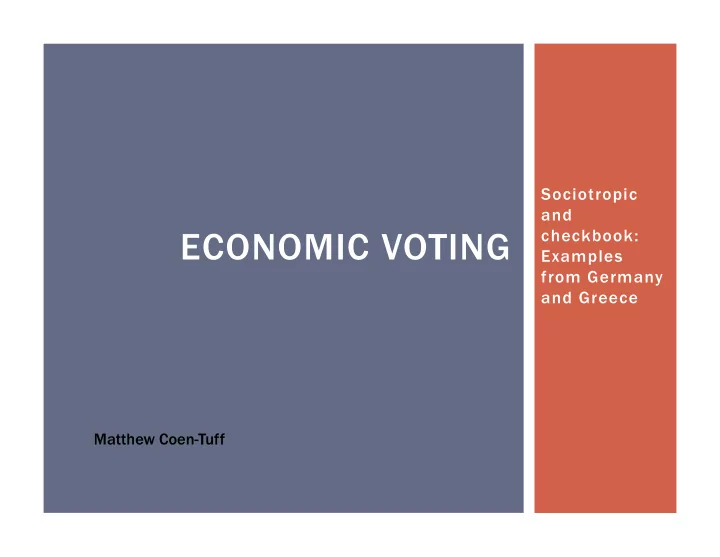

Sociotropic and ECONOMIC VOTING checkbook: Examples from Germany and Greece Matthew Coen-Tuff
WHAT IS ECONOMIC VOTING Economic voting is the concept that people vote in support of the governing party when economic times are good and punish the party in power when times are economically bad
SOCIOTROPIC VS. CHECKBOOK Sociotropic Economic Voting- This is the theory that when economic voting occurs people who are voting take a macroeconomic view of the economy and do not consider there own financial standing. Checkbook Economic Voting- The theory that when economic voting occurs people who are voting consider their own financial standing (their checkbook) first when evaluating the government.
WHY GREECE? Most notable country going through the worst of the debt crisis Fear that Greece will leave the European Union Rise of Radical Parties: a) SRYIZA- Coalition of the Radical Left outperformed PASOK (PanHellenic Socialist Movement) in most recent election b) Golden Dawn- Ultra-Nationalists with neo-nazi ties gaining more and more support (Finished fourth in most recent election winning 16 seats in hellenic parliament)
WHY GERMANY? Main country involved in bailing out countries in EU in severe debt Stable government throughout European debt crisis-Merkel elected three times German Chancellor Angela Merkel has insisted that “Euro is our common destiny and Europe is our common future”
WHY DOES IT MATTER? 1. Important to show the difference between Sociotropic and Checkbook economic voting 2. Show how different situations can cause different kinds of economic voting 3. Shows how radical/fringe parties can gain support from people who are disillusioned with the parties in power .
LITERATURE REVIEW
ECONOMIC VOTING REVIEWED Bloom and Price (19 Bloom and Price (1975) 75) reviewed the economic voting theory and found that: the party in power receives little or no added support when the economy is up when the economy is down the party in power is severely punished. This is especially true for people who are suffering personally from the economic downturn. This phenomenon is known as “throwing the rascals out”
ECONOMIC VOTING IN P.I.G.S. What Nadeau and Le Nadeau and Lewis-Beck wis-Beck found- 1. the PIGS countries have much stronger economic voting trends than in Non-PIGS Northern European countries. 2. The economic vote is 60 percent stronger in PIGS countries. Nadeau and Le Nadeau and Lewis-Beck wis-Beck attribute the strong effect that economic voting has to the fact that the governments of these Southern European countries often have less complex coalitions dominated by one party.
SOCIOTROPIC VOTING IN GREECE Ro Roula Nezi investigated the extent to which retrospective sociotropic evaluations about the state of the economy are associated with support for the incumbent party. The results suggest that sociotropic economic evaluations are associated with government party support, but in a period when the economy is at its worst the incumbent has no real chance of winning
CHECKBOOK VOTING IN GERMANY Ander Anderson & on & Hec Hecht t (2010) found that there was evidence that indicated the people who had personally been affected by the economic downturn were less likely to vote for the government in power (i.e. the two main parties) more likely to vote for the Leftist parties or ones that they thought would bring about a different coalition government
FINDINGS & Greece & Germany METHODOLOGY
THEORY Based on the literature review and preliminary analysis of the data I hypothesized: Germany will have economic voting that will be most like checkbook economic voting. Germans who are suffering financially will not be in support of the government Greece will have economic voting that will be most like sociotropic economic voting. Greeks no matter their financial standing will view the economy as a whole and will subsequently not support the government
DATA & METHODS Greek statistics come from the Eurobarometer German statistics come from Leibniz Institute for the Social Sciences called the Gesis. Using nominal and ordinal level variables I derive several tables that exemplify the relationship of economic voting in Greece and Germany
GREECE 91.7%
GREECE
GERMANY
GERMANY
RESULTS & DISCUSSION
RESULTS The literature review accompanied by the data and findings has shown two things: 1. Greece has economic voting that is most closely related to sociotropic economic voting. Greeks, who feel financially stable, as well as Greeks, who are not at all, find it hard to support the party in power 2. Germany has economic voting that is most closely related to checkbook economic voting. Germans who are suffering the most are identifying with other parties that are in the opposition at a statically significant level.
WHAT HAS BEEN SHOWN Economic voting has many facets. Depending on the country’s economic situation and how the people view it can vary how economic voting takes place. Showing the affects of the economic crisis and how the debt crisis and economic downturn can cause rational people to turn to radical parties
ANY QUESTIONS Thank you for your time
REFERENCES
Recommend
More recommend